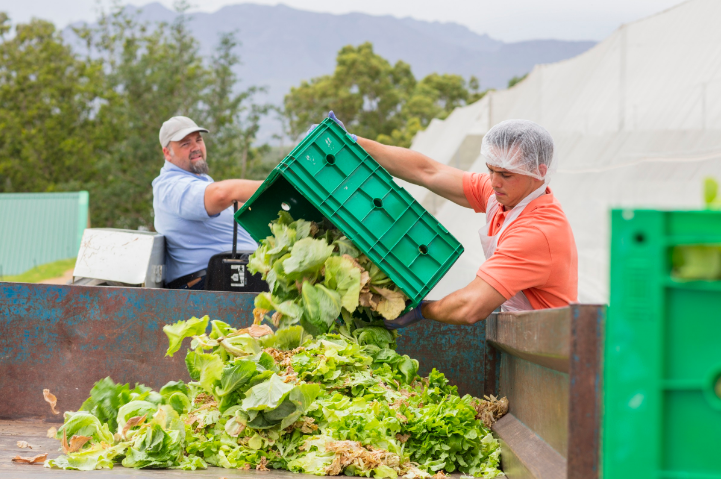Environment & Energy
Related: About this forumHow Does Food Waste Really Impact the Environment?
Deforestation, water consumption, and methane emissions are just the beginning.The U.S. alone wastes 133 billion pounds of food every year. That's $161 billion worth, or 31% of the entire food supply and a quarter of all municipal solid waste. Meanwhile, 38 million Americans are food insecure.
Food waste is not only a missed opportunity for millions of hungry people; it's also a massive climate problem. Thirty-one percent of food wasted means 31% of the energy, water, and materials used to grow, harvest, package, distribute, and store it is also used in vain. The result is 2.1 million Lady Liberties worth of discarded nourishment, left to fester in landfills where it will emit catastrophic amounts of greenhouse gases.
Here's an overview of where food waste comes from, how it impacts the planet, and what you can do to help out at home.
Sources of Food Waste
The U.S. Environmental Protection Agency evaluates food waste from five generating sectors: institutional, commercial, industrial, residential, and food banks.4 Institutional waste is what comes from offices, hospitals, nursing homes, jails and prisons, and universities. Commercial waste comes from supermarkets, restaurants, hotels, and other food sellers. Industrial waste is generated through food and beverage manufacturing and processing. And residential waste is what's produced at home.
The EPA does not evaluate agricultural-level food waste—that is, the food that's left in the field "because of low crop prices or too many of the same crops being available"—which Feeding America notes is also a big problem.
The industrial sector—i.e., food manufacturing and processing—is the largest waste generator of all, accounting for 39%. Roughly 30% is commercial, 24% residential, and 7% institutional. The waste from food banks is minuscule, according to the EPA's 2018 Wasted Food Report. Of the waste classed as commercial, 55% is from restaurants and 28% from supermarkets.
Where Does Wasted Food Go?
Not all wasted food is sent to landfills and incinerators. Here's how that waste is distributed, according to the EPA's 2018 report.
36% goes to landfills
21% becomes animal feed
10% is turned into biogas and biosolids through anaerobic digestion
9% returns to the soil through land application
8% is incinerated
7% is donated
4% is used to power wastewater and sewer treatment plants
3% is composted
2% is used for biochemical processing
Much more: https://www.treehugger.com/food-waste-environmental-impact-5211807

OnlinePoker
(5,725 posts)BigmanPigman
(51,630 posts)SheltieLover
(57,073 posts)Rhiannon12866
(206,072 posts)I found it awfully disturbing that we waste so much when there are so many people in need - and prices have gone up so much. Not to mention that it's contributing to pollution! We have to find a way to do better. ![]()
![]()
SheltieLover
(57,073 posts)Perhaps donations to food banks & homeless shelters might alleviate some of the problem. ![]()
Rhiannon12866
(206,072 posts)SheltieLover
(57,073 posts)jimfields33
(15,967 posts)Threats or actual Lawsuits against restaurants and stores stopped all that.
OnlinePoker
(5,725 posts)I was not allowed to give any of the food to soup kitchens or food banks because, if someone got sick, the federal government would have been liable. This food was well within it's best before date range. Multiple pallets (probably 5 tons in all) of canned vegetables, flour, canned fish, etc were hauled off to the landfill and dumped from the back of the truck. I had to insure the landfill bulldozer rolled over the pile of goods numerous times to destroy them. It's a good thing I didn't follow my conscience and just donate the goods anyways because when the driver and I came around to the front of the truck, there was a military police vehicle blocking us in. The look of disappointment on their face when they checked the truck and knew they wouldn't get to charge me for stealing was priceless.
hunter
(38,328 posts)In San Francisco you can put all sorts of compostable waste in the green bins.
https://sfrecycles.org/
The green bins are just for yard waste where we live.
As the article notes, the larger environmental impacts may be in producing the wasted food, especially for meat and dairy products.
Unwind Your Mind
(2,042 posts)That requires all food waste to go in the green bin.
We’ve already been doing that for a long time so I didn’t study the details.
I’m sure people will be complaining all over nextdoor 😉
I’m interested to see what the effects will be. Particularly for businesses, imagine how much scrap something like a juice bar generates. We’ll be rich in natural compost?